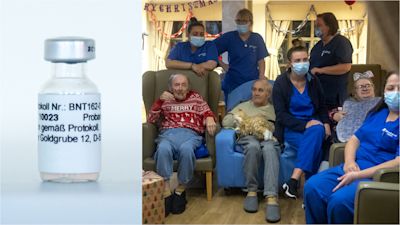Care home residents no longer first in line for Pfizer Covid vaccine after roll out issues

Video report by ITV News Political Correspondent Paul Brand
Care homes across the country look set to be disappointed, with the first doses of the newly approved Pfizer Covid-19 vaccine unlikely to be rolled out to residents next week.
Elderly people in care homes and their carers had been top of the priority list to receive the jab.
But with the Pfizer/BioNTech vaccine requiring ultra-low temperatures, the first batch of doses is now being sent to hospitals instead - to be given to NHS staff, care home staff and the over-80s first.
The change in tactic has prompted health officials to urge patience.
Helen Davies-Parsons, chief executive of the Dormy Care Communities, said "expectations were raised" for a vaccination roll out in the next week.
"There's an anxiety as to when it will happen," she told ITV News but added: "I think it's when rather than if, though."
While Sanjiv Joshi - managing director of the Caron Group - believes other vaccines might be deployed in elderly care homes first.
"We've got other vaccines in the pipeline which are easier to manage - they do not need to remain at -70C. So perhaps that's where the solution will be," he told ITV News.
The care home boss added that, even if Pfizer remained the only jab available into January, a vaccination programme would "get there".
"I'm sure that with a united effort - from scientists, from the logistics, from the NHS, from public health - that we will get there. I'm confident that once we have the solution that it will be implemented."
Developers of the Pfizer have said the jab can be sent to care homes - as long as it travels for no more than six hours after it leaves cold storage and is then put in a normal fridge at 2C to 8C.
While Downing Street has said the NHS is working closely with the regulator to find a way to administer the Pfizer vaccine in care homes.
Speaking on ITV's This Morning, deputy chief medical officer Professor Jonathan Van-Tam said: "The NHS, the MRHA are working really hard right now to try and find a solution so that we can get this into care homes if we possibly can.
"But there is no absolute assurance of that, because one thing we can’t do is end up with a vaccine which has been handed incorrectly and we end up with a vaccine that is not properly viable at the end of the distribution chain".
Prime Minister Boris Johnson on Wednesday warned of “immense logistical challenges” in getting the vaccine to those who need it most.
The Joint Committee on Vaccination and Immunisation (JCVI), which outlined the list of priority groups first in line for a vaccine, said it had been designed to be flexible.Professor Anthony Harnden, deputy chairman of the JCVI, told the Today programme: "Our clear remit was to decide on prioritisation groups but that there were going to be vaccine product storage, transport and administration constraints, and individual local circumstances.
Prof Harnden called for a “very small degree of patience”, with other vaccines – which could have fewer issues with transport and storage – “in the pipeline”.